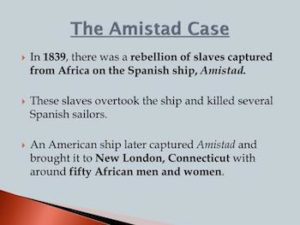
*On this date, 1841, United States v. Schooner Amistad, 40 U.S. (15 Pet.) 518 (1841), was decided. This was a United States Supreme Court case resulting from the rebellion of Africans on board the Spanish schooner La Amistad in 1839. It was an unusual freedom suit that involved international issues, parties, and United States law. The case was the most important court case involving slavery before being eclipsed by that of Dred Scott in 1857.
The schooner was traveling along the coast of Cuba on its way to a port for the re-sale of the slaves. The African captives, Mende people who had been kidnapped in the area of Sierra Leone in West Africa, illegally sold into slavery and shipped to Cuba, escaped their shackles, and took over the ship. They killed the captain and the cook; two other crew members escaped in a lifeboat. The Mende directed the two Spanish navigator survivors to return them to Africa. The crew tricked them, sailing north at night. La Amistad was later apprehended near Long Island, New York, by the United States Revenue Cutter Service (the predecessor of the U.S. Coast Guard) and taken into custody.
In 1840, a federal district court found that the transport of the kidnapped Africans across the Atlantic Ocean on the Portuguese slave ship Tecora was in violation of laws and accepted treaties against the international slave trade by Great Britain and Ireland, Spain, and the United States. The captives were ruled to have acted as free men when they fought to escape their kidnapping and illegal confinement. The court ruled the Africans were entitled to take whatever legal measures necessary to secure their freedom, including using force. Under international and Southern sectional pressure, American President Martin Van Buren ordered the case to be appealed to the Supreme Court. It affirmed the lower district court ruling and authorized Mende's release but overturned the lower court's additional order that they be returned to Africa at government expense.
The widely publicized court cases in the United States federal district court and eventually the U.S. Supreme Court in Washington, D.C., in 1841 addressed international issues and helped the abolitionist anti-slavery movement. Supporters arranged for temporary housing of the Africans in Farmington, Connecticut, as well as funds for travel. In 1842, the thirty-five who wanted to return to Africa and American Christian missionaries were transported by ship to Sierra Leone.